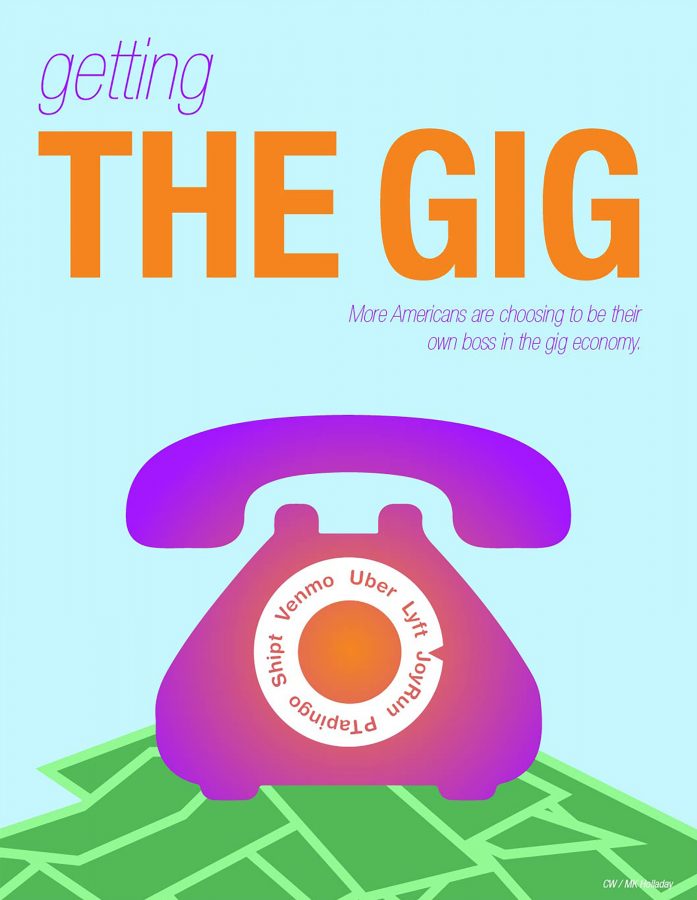Platforms are online markets made by apps and websites that provide a digital exchange for goods and services. Often those services are carried out by gig workers.
The basic idea of a gig-based economy is that workers take on ‘gigs,’ or non-salaried, non-committal employment, for monetary compensation proportionate to the duration and difficulty of the task they are hired for.
News sites consistently report on how this mystifying sector of job growth is impacting American workers. Just this weekend, the New York Times editorial board published an opinion piece arguing that the gig economy is failing its workers by allowing companies to avoid paying benefits due to their employees’ status as contract workers.
Gigs have been around since the dawn of economics, but with the development of apps like Uber, Lyft, JoyRun and more, the amount of gig work is on a surging rise, thanks largely to the new high-traffic digital marketplaces these apps create.
While there is no shortage of criticism of the developing platform-service market, it does not appear to have come anywhere close to stunting its growth. Uber alone, with its ride-sharing service, has grown since its 2009 founding to over 160,000 active drivers in 2014, according to Forbes.
The Pew Research Center further elucidates the stunning growth of the platform-based economy. According to the center, 24 percent of Americans reported earning money in some way through online platform services, based on numbers from 2013. Of that number, 40 percent were black or non-white Hispanic – as opposed to 27 percent of the national workforce population – and 23 percent were students.
Perhaps even more dizzying, the apps that largely fuel this online economy continue to grow in both available locations and actual numbers. Apps like JoyRun and Uber have only recently reached Tuscaloosa, tapping into new markets that hold little competition, and new apps are being made every day, competing for investors’ eyes.
While competition does already exist, it is often hindered by regulations circumvented by apps thanks to their novel status as digital-based companies. For instance, taxi drivers in Tuscaloosa denounced a Tuscaloosa ordinance that allowed Uber to purchase a single $5,000 business license, while taxi drivers were required to pay yearly subscriptions to maintain their own, as reported by The Tuscaloosa News.
With new apps created every day, the scale is only getting larger. At the University, many students are happy to utilize this low-commitment model to earn some extra pocket money. Brandon Rose, a junior majoring in kinesiology at the University, decided to work for the JoyRun company after working for a similar startup service called Envoy, which was bought out by Joyrun.
JoyRun’s business structure creates a system where Rose gets paid depending on how much he charges for a run. In addition to working as a food runner whenever he pleases, Rose also works to market the app to other students, as one of thirteen student ambassadors on campus.
“I’m just out here talking to people and getting paid, and it’s super flexible,” Rose said.
Scheduling is extremely flexible because often, Rose only needs to sign up to table on the quad for a couple of hours at a time, and he can go on a run whenever he signs in through the app.
“We just recently got $10 million to expand into the southeast,” Rose said, indicating that the market was likely to only grow for the foreseeable future as many venture capitalist investors have taken notice in the company.
JoyRun is not the only app trying to grow down south. Tapingo, a new food ordering app, has recently started advertising on campus as a service that will cut down on wait times for food. The app essentially works through a distance card reader; enter your credit or debit card, order through the app and the restaurant is notified to your order and you pick it up without having to go through a line.
Tapingo may not provide many jobs aside from its marketing campaign, but after two weeks of being on campus, it has impacted the purchasing habits of students and student workers like Haley Snider, a junior sales & real estate major and manager at Starbucks.
“I think it alleviates pressure on our register people to pound through orders, giving them more time for that personal interaction,” Snider said.
The hope of the managers at Starbucks is that the app will eventually catch on and decrease the average wait time for students. Meanwhile, the hope of Tapingo executives is that every student on campus downloads the app.
“It’s kind of like any other free app, it makes money when you download it,” Snider said.
Additionally, she said Tapingo is working on corporate partnerships both with restaurants that use the service and the University, as the app can accept both Bama Cash and Dining Dollars.
“We use it as students so it’s easier to use for us,” said Abigail Sisti, a sophomore majoring in biology who works with the app at the Starbucks register.
Thanks to the tech-savviness of the millennial generation, Sisti says that incorporating new apps is fairly easy, since they require little training for employees.
Snider works as a JoyRun food runner herself. While her part-time job at Starbucks pays more, she says that JoyRun gives her an extra way to make a quick dollar.
“It’s been a really good way to make money,” Snider said. “I think it’s quite ingenious really.”









